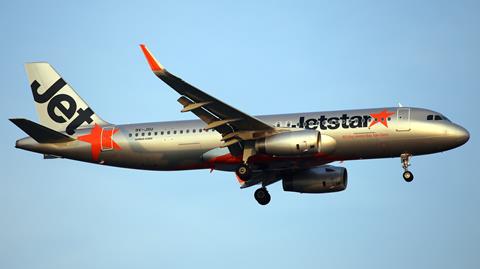Singapore-based low-cost carrier Jetstar Asia will be shut down by end-July, following a “strategic restructure” by parent Qantas Group.
The intra-Asia operator will continue to offer flights on a progressively reduced schedule until its last flight on 31 July.

Qantas on 11 June says Jetstar Asia faces “growing challenges” including high airport costs, intensified competition, as well as supplier costs which have doubled in recent years.
“This has fundamentally challenged the low-cost airline’s ability to deliver returns comparable to the stronger performing core markets in the group,” says the airline, which notes that Jetstar Asia is projected to be loss-making in the year ending 30 June.
Qantas states that the closure of Jetstar Asia will enable it to recycle A$500 million ($326 million) in capital for its fleet renewal efforts. Jetstar Asia’s 13 Airbus A320s will be progressively redeployed to Australia and New Zealand, to support Jetstar Airways’ operations in the region.
The Australian carrier also expects to deploy some of the A320s to replace its older jets its regional operations in the Western Australia resources sector.
Qantas chief Vanessa Hudson says: “We’re making disciplined decisions which recycle capital across our business and prioritise it to stronger performing segments as well as strategic growth initiatives like Project Sunrise.”
The closure will only impact 16 intra-Asia routes and will not affect flights by Jetstar Airways between Australia and Asia, or flights operated by Japan-based unit Jetstar Japan.
Despite the closure of Jetstar Asia, Qantas says Singapore is still a “critical hub” for its international mainline network.
“Singapore remains a critical hub for the Qantas Group as its third largest international airport. Qantas also offers connections from Singapore through nearly 20 codeshare and interline partners to a variety of destinations across Asia,” it adds.
Qantas adds that the closure of Jetstar Asia will result in total financial impact of around A$175 million, comprising one-off redundancy and restructuring costs, as well as non-cash expenses in the form of currency translation losses and asset write-downs from “consequential changes” in the group fleet structure.
Jetstar Asia’s closure caps off more than 20 years of operations. The airline began operating in 2004 as one of the country’s three low-cost operators.
A year later, it merged with rival Valuair in what was the first major consolidation in the region’s fledgling low-cost sector.


























